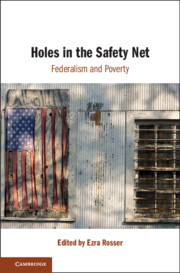Book contents
- Holes in the Safety Net
- Holes in the Safety Net
- Copyright page
- Dedication
- Contents
- Contributors
- Acknowledgments
- Introduction
- Part I Welfare and Federalism
- Part II States, Federalism, and Antipoverty Efforts
- Part III Advocacy
- 9 Federalism in Health Care Reform
- 10 Poverty Lawyering in the States
- 11 Conclusion
- Index
10 - Poverty Lawyering in the States
from Part III - Advocacy
Published online by Cambridge University Press: 05 September 2019
- Holes in the Safety Net
- Holes in the Safety Net
- Copyright page
- Dedication
- Contents
- Contributors
- Acknowledgments
- Introduction
- Part I Welfare and Federalism
- Part II States, Federalism, and Antipoverty Efforts
- Part III Advocacy
- 9 Federalism in Health Care Reform
- 10 Poverty Lawyering in the States
- 11 Conclusion
- Index
Summary
This chapter clarifies how the practice of poverty law has changed since Congress created federally funded legal services in 1964. Lawyering on behalf of poor people has always been deeply entangled with the actions of individual states. However, 50 years since the War on Poverty, poverty lawyering has become even more state focused. The increasingly state-based nature of the work has wide-ranging implications for legal practice and the development of doctrine. The chapter pays particular attention to the limitations and opportunities lawyers face that are specific to poverty law. Lawyers practice in spite of restrictions placed on federally funded organizations, challenges of coordination across states, and the fragility of private funding and pro bono assistance. States also face limitations in their lawmaking, but these fiscal, bureaucratic, and legislative weaknesses create various openings in which poverty lawyers can lobby and litigate.
- Type
- Chapter
- Information
- Holes in the Safety NetFederalism and Poverty, pp. 215 - 228Publisher: Cambridge University PressPrint publication year: 2019

